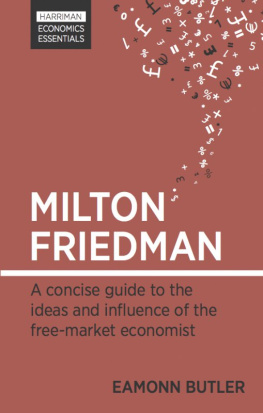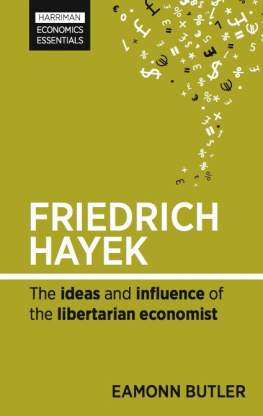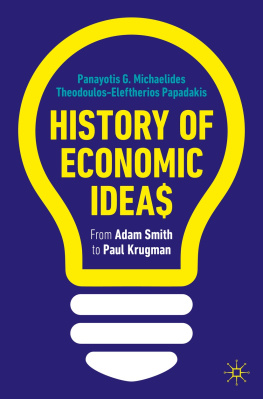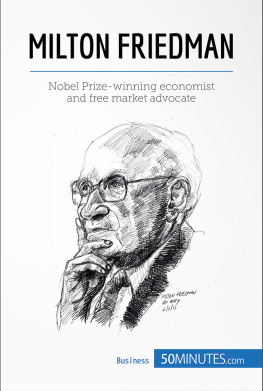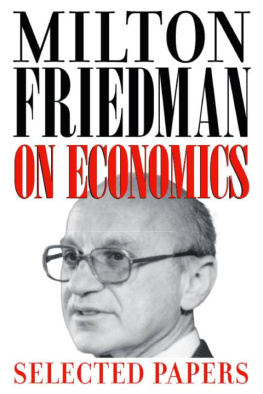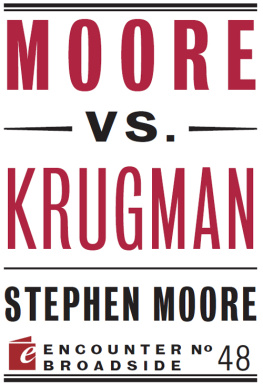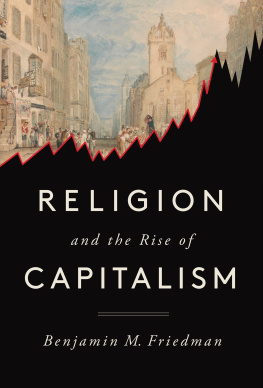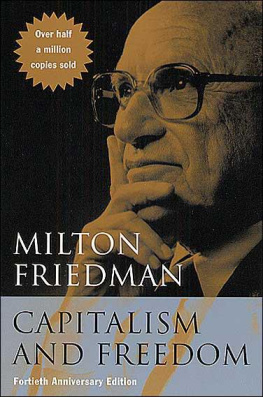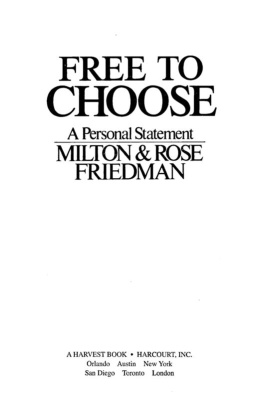Eamonn Butler - Milton Friedman: A Concise Guide to the Ideas and Influence of the Free-Market Economist
Here you can read online Eamonn Butler - Milton Friedman: A Concise Guide to the Ideas and Influence of the Free-Market Economist full text of the book (entire story) in english for free. Download pdf and epub, get meaning, cover and reviews about this ebook. year: 2011, publisher: Harriman House, genre: Politics. Description of the work, (preface) as well as reviews are available. Best literature library LitArk.com created for fans of good reading and offers a wide selection of genres:
Romance novel
Science fiction
Adventure
Detective
Science
History
Home and family
Prose
Art
Politics
Computer
Non-fiction
Religion
Business
Children
Humor
Choose a favorite category and find really read worthwhile books. Enjoy immersion in the world of imagination, feel the emotions of the characters or learn something new for yourself, make an fascinating discovery.
- Book:Milton Friedman: A Concise Guide to the Ideas and Influence of the Free-Market Economist
- Author:
- Publisher:Harriman House
- Genre:
- Year:2011
- Rating:5 / 5
- Favourites:Add to favourites
- Your mark:
Milton Friedman: A Concise Guide to the Ideas and Influence of the Free-Market Economist: summary, description and annotation
We offer to read an annotation, description, summary or preface (depends on what the author of the book "Milton Friedman: A Concise Guide to the Ideas and Influence of the Free-Market Economist" wrote himself). If you haven't found the necessary information about the book — write in the comments, we will try to find it.
One of the most important economic thinkers of all time
- Paul Krugman
Milton Friedman changed the world. From free markets in China to the flat taxes of Eastern Europe, from the debate on drugs to interest rate policy, Friedmans skill for vivid argument and ideas led to robust and often successful challenges to a dizzying amount of received wisdom.
Relying on big-picture economic analysis and an insistent faith in human freedom, he took on the economic and political orthodoxies of his day - and if he didnt always win, he never failed to change the terms of the debate.
Rarely an uncontroversial figure, with his disciples and detractors to this day, this is neither a credulous nor a critical look at the Nobel laureate. A brand new guide, it simply sets out to explain his economic and public policy thinking in a straightforward and accessible way for the general reader and student.
Find out:
- how Friedman undermined Keynesianism and the prevailing wisdom of large-scale economic intervention
- how he demonstrated the true cause of the Great Depression and identified its real culprits (they werent the ones jumping out of the windows)
- what Friedman believed really destroys the value of the money in your pocket and how it can be stopped
- his arguments for why regulations and minimum- wage laws actually achieve lower standards and greater poverty
- his reasons for why big corporations prefer markets that arent free, and how high taxation harms the wealthy less than anyone else.
With more, too, on democracy, equality, global trade, education, public services and financial crises, this is a concise but comprehensive guide to the influence of a key 20th century thinker.
It is a must-read for anyone who wants to know more about the economist whose work changed everything.
Eamonn Butler: author's other books
Who wrote Milton Friedman: A Concise Guide to the Ideas and Influence of the Free-Market Economist? Find out the surname, the name of the author of the book and a list of all author's works by series.

